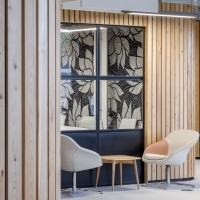To provide the best experiences, we use technologies like cookies to store and/or access device information. Consenting to these technologies will allow us to process data such as browsing behaviour or unique IDs on this site. Not consenting or withdrawing consent, may adversely affect certain features and functions.
The technical storage or access is strictly necessary for the legitimate purpose of enabling the use of a specific service explicitly requested by the subscriber or user, or for the sole purpose of carrying out the transmission of a communication over an electronic communications network.
The technical storage or access is necessary for the legitimate purpose of storing preferences that are not requested by the subscriber or user.
The technical storage or access that is used exclusively for statistical purposes.
The technical storage or access that is used exclusively for anonymous statistical purposes. Without a subpoena, voluntary compliance on the part of your Internet Service Provider, or additional records from a third party, information stored or retrieved for this purpose alone cannot usually be used to identify you.
The technical storage or access is required to create user profiles to send advertising, or to track the user on a website or across several websites for similar marketing purposes.
 A new study by independent job board, CV-Library claims four in 10 (42.9 percent) professionals feel their mental health is worse than it was a year ago. What’s more, female workers appear to be suffering more than their male counterparts (46.9 percent of women vs. 39.9 percent of men). More →
A new study by independent job board, CV-Library claims four in 10 (42.9 percent) professionals feel their mental health is worse than it was a year ago. What’s more, female workers appear to be suffering more than their male counterparts (46.9 percent of women vs. 39.9 percent of men). More →













 Highly talented workers join prestigious firms, claims new research by the
Highly talented workers join prestigious firms, claims new research by the 
























October 14, 2020
Many people are demoralised, disconnected and worried. We need to talk about that.
by Steven Buck • Comment, Wellbeing, Working lives